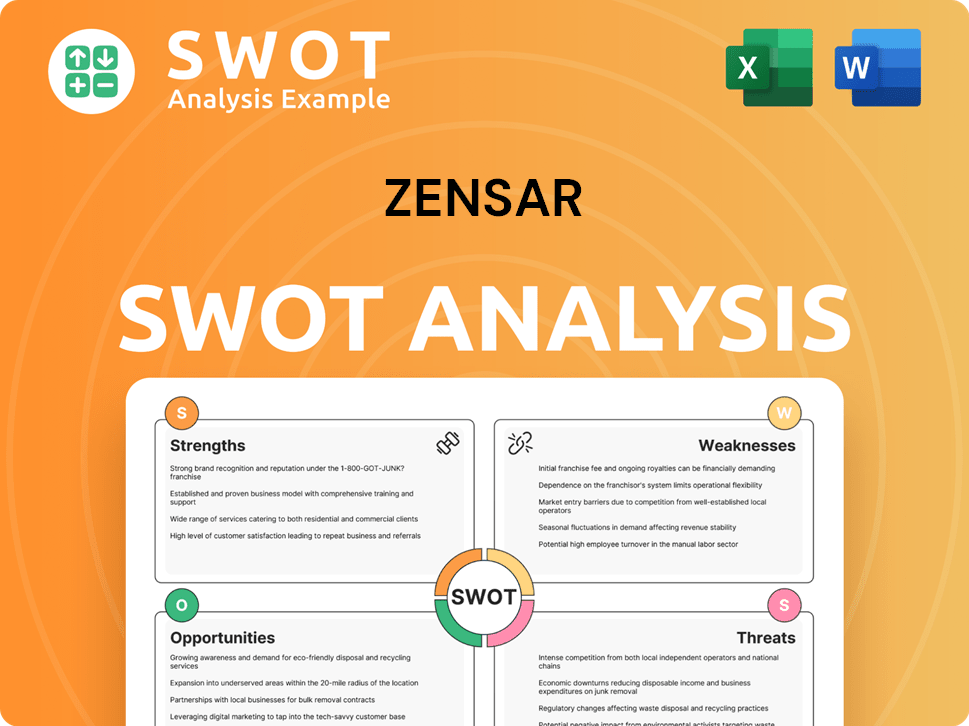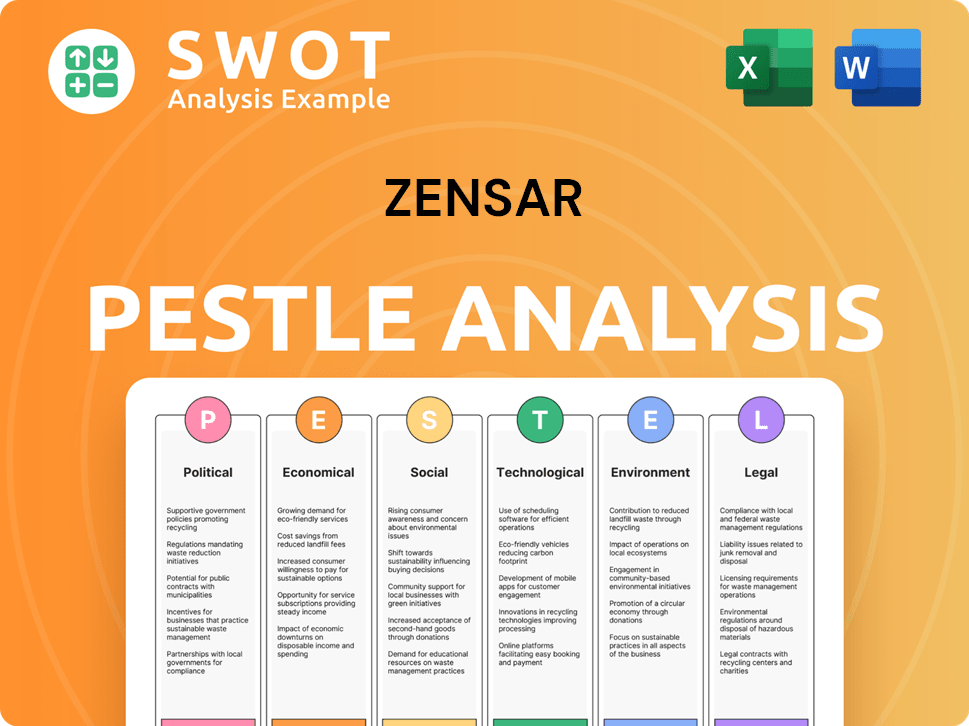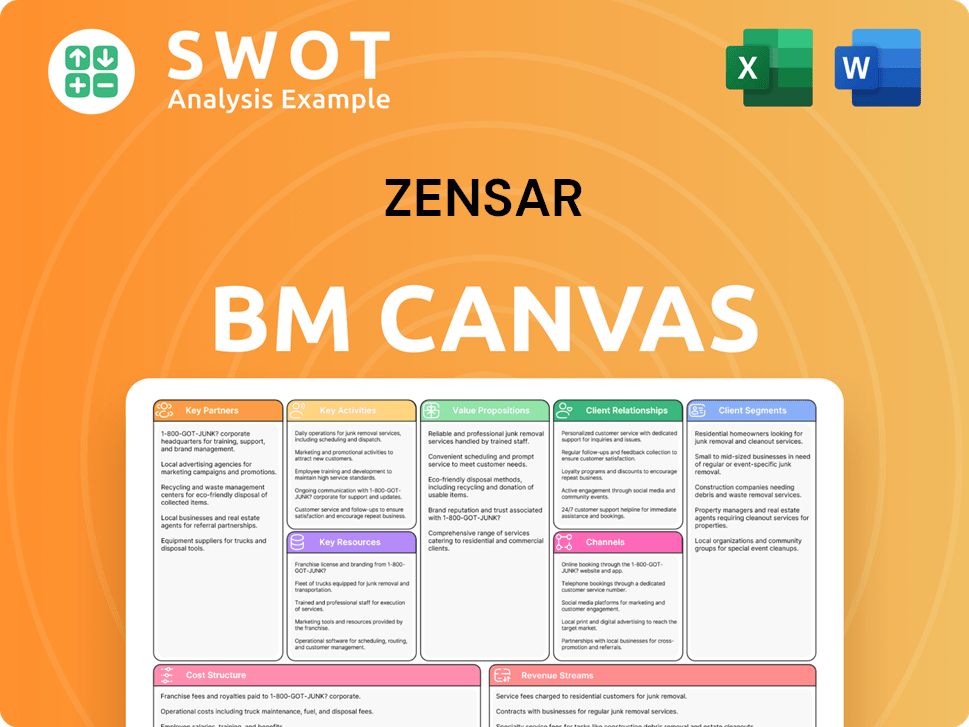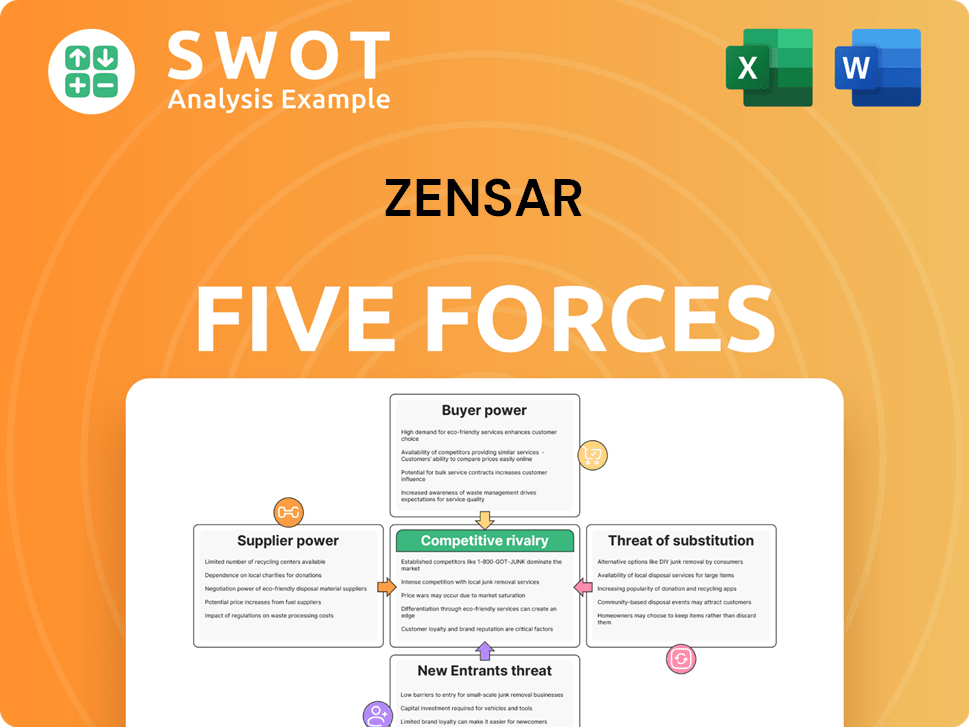Zensar Bundle
Who are Zensar's Customers?
In the fast-paced world of digital transformation, understanding the Zensar SWOT Analysis is crucial for success. This analysis delves into the core of Zensar Technologies' strategy, specifically focusing on the crucial aspects of customer demographics and target market. By understanding who Zensar serves, we gain insights into their strategic direction and market performance.

This exploration will dissect Zensar's customer demographics, revealing the industries and geographical locations that form its Zensar target market. We'll examine the evolution of its Zensar customer profile to understand how Zensar adapts to the changing needs of its Zensar client base, ensuring it remains relevant in a competitive landscape. Ultimately, this analysis provides actionable insights for investors, analysts, and anyone seeking to understand Zensar's growth trajectory, considering aspects like "What are the customer demographics of Zensar in the US" and "How does Zensar segment its target market".
Who Are Zensar’s Main Customers?
When examining the customer demographics of Zensar, it's crucial to recognize its B2B focus. Zensar's target market consists primarily of businesses across various sectors, not individual consumers. This approach shapes its customer profile, emphasizing industry-specific needs and technological solutions.
Zensar's ideal customer is typically a large to mid-sized enterprise seeking digital transformation and operational efficiency. These clients are looking to leverage technologies like AI, cloud computing, and cybersecurity to enhance their business processes and customer experiences. Understanding this Zensar client base is key to grasping its market strategy.
The company's market analysis reveals a strategic focus on several key industry verticals. These include Hi-tech Engineering, Banking and Financial Services, Insurance, Healthcare and Life Sciences, Telecom, Consumer Services, and Manufacturing. Within these segments, Zensar tailors its services to address specific challenges and opportunities.
Zensar's primary customer segments are defined by the industries they serve. Banking and Financial Services and TMT have shown consistent revenue growth. Healthcare and Life Sciences also demonstrate significant expansion, driven by strategic acquisitions.
Banking and Financial Services reported a 3.4% sequential QoQ revenue growth in constant currency in Q4 FY25. TMT grew by 1.7% in the same period. Healthcare and Life Sciences saw a 24.0% YoY revenue growth in Q3 FY25.
Zensar allocates significant resources to research and development, particularly in AI and machine learning. This focus aligns with the needs of clients prioritizing advanced technologies. The company's investments in service lines and strategic verticals support its market position.
In 2024, Zensar allocated $50 million for research and development in AI and machine learning. This investment underscores its commitment to providing cutting-edge solutions. Zensar's client-centric approach enhances its position in key segments.
The company's strategic investments and client-centric approach have solidified its position in these key segments. For more insights, consider reading a Brief History of Zensar. The evolution of Zensar's customer demographics is driven by market research, product offerings, and external trends, ensuring it remains aligned with the needs of its target market.
Zensar SWOT Analysis
- Complete SWOT Breakdown
- Fully Customizable
- Editable in Excel & Word
- Professional Formatting
- Investor-Ready Format

What Do Zensar’s Customers Want?
The customer needs and preferences of Zensar Technologies' clients are centered on digital transformation, operational efficiency, and gaining a competitive edge. Their purchasing decisions are heavily influenced by the ability of Zensar's offerings to provide scalable, secure, and innovative solutions. These solutions must address complex business challenges and integrate new technologies like AI and machine learning.
Clients prioritize solutions that offer robust analytical capabilities and advanced data-driven insights. They seek practical benefits such as cost reduction, improved response times, and enhanced customer engagement. Loyalty is built upon consistent service delivery, reliable deliverables, and adherence to SLAs.
Zensar addresses common pain points such as legacy system modernization, data management complexities, and the need for enhanced cybersecurity. The company tailors its marketing and product features by emphasizing its 'Experience Engineering and Engagement (EEE)' value proposition, focusing on conceptualizing, designing, engineering, marketing, and managing digital solutions.
Customers are primarily driven by the need to modernize their IT infrastructure and processes. They aim to leverage digital technologies to improve efficiency and create new revenue streams. This includes cloud adoption, AI integration, and data analytics.
Clients seek solutions that streamline operations, reduce costs, and improve overall performance. Automation, process optimization, and enhanced cybersecurity are key priorities. They want to achieve more with less, increasing their profitability.
Customers are looking for ways to differentiate themselves in the market. They want to use technology to offer better products, improve customer experiences, and gain a strategic edge. Innovation and agility are highly valued.
Clients demand solutions that can grow with their business and protect their data. Security is a top concern, especially in light of increasing cyber threats. They require robust and reliable systems.
Customers want to leverage data to make informed decisions and improve business outcomes. Advanced analytics, AI, and machine learning are crucial for extracting valuable insights. They need actionable intelligence.
Clients are focused on improving customer experiences through digital channels. They seek solutions that enable personalized interactions, better service, and increased customer loyalty. This includes omnichannel strategies and CRM integration.
The Marketing Strategy of Zensar is tailored to address the specific needs of its customer base. Zensar's investments in R&D, with $50 million allocated in 2024, reflect its commitment to providing cutting-edge solutions. The company's success in securing contracts with 30 Fortune 500 companies for its 'Zensar Smart AI Solutions' demonstrates the demand for AI-driven services. Zensar's focus on industry-specific solutions, such as its work with Tesco, further illustrates its customer-centric approach.
Understanding the needs of the Zensar customer profile is essential for effective service delivery. The company's Zensar target market includes various industries, each with specific requirements. Zensar's Zensar client base benefits from solutions that address their unique challenges.
- Digital Transformation: Implementing new technologies to modernize IT infrastructure.
- Operational Efficiency: Streamlining processes to reduce costs and improve performance.
- Competitive Advantage: Gaining a strategic edge through innovation and agility.
- Scalability and Security: Ensuring solutions can grow with the business and protect data.
- Data-Driven Insights: Leveraging data analytics and AI to make informed decisions.
- Enhanced Customer Engagement: Improving customer experiences through digital channels.
Zensar PESTLE Analysis
- Covers All 6 PESTLE Categories
- No Research Needed – Save Hours of Work
- Built by Experts, Trusted by Consultants
- Instant Download, Ready to Use
- 100% Editable, Fully Customizable

Where does Zensar operate?
Zensar Technologies has a significant global footprint, with a strong presence across the Americas, Europe, and Africa. The company's geographical market presence is strategically structured to capitalize on diverse regional opportunities and client needs. This widespread reach allows Zensar to offer tailored services and solutions, catering to the specific demands of each market.
The United States constitutes Zensar's largest market, contributing a substantial portion of its revenue. Europe also demonstrates strong growth, while Africa presents opportunities for expansion and localization. Zensar's strategic focus on these key regions, combined with its expansion plans, reflects its commitment to sustained growth and market relevance. Understanding the nuances of each region's customer demographics is crucial for Zensar's success.
Zensar's strategic approach to its geographical market presence involves tailoring its services to meet the unique needs of each region. This includes adapting its offerings to align with local market dynamics, customer preferences, and regulatory requirements. The company's ability to customize its solutions is a key factor in its ability to attract and retain clients in diverse markets.
The United States is Zensar's largest market, representing a significant portion of its revenue. In March 2024, the US market accounted for a substantial 67.2% of the revenue share. This strong presence indicates the importance of the US market for Zensar's overall financial performance.
Europe shows strong growth, with a 10.0% year-over-year growth in constant currency in Q4 FY25. The sequential quarter-on-quarter growth was 2.5%. This growth highlights the increasing demand for Zensar's services in the European market and the company's ability to capitalize on these opportunities.
Africa's growth was 0.9% sequentially QoQ in Q4 FY25. However, the region saw a slight decline of 1.7% YoY in constant currency terms. Zensar continues to focus on expanding its presence in Africa, adapting to local market dynamics and customer needs.
Zensar also maintains offices and a customer base in India and the UK. These markets are crucial for Zensar's global operations. The UK engagements include digital transformation contracts with major entities like Tesco Insurance and Money Services.
Zensar's market strategies are designed to enhance its global footprint and cater to the specific needs of its diverse client base. These strategies include expansion, strategic acquisitions, and localized offerings.
- Expansion to 36 Countries: By the end of 2024, Zensar aims to expand its presence to 36 countries, including establishing new offices in emerging markets in Asia and Africa.
- Strategic Acquisitions: The acquisition of BridgeView Life Sciences in the US healthcare sector in July 2024 aims to deepen market penetration and diversify revenue streams.
- Localized Offerings: Tailoring services to meet the unique needs of each region, including adapting offerings to local market dynamics, customer preferences, and regulatory requirements.
- Digital Transformation: Focus on cloud-first ecosystems and infrastructure modernization, particularly in the UK with clients like Tesco Insurance and Money Services.
- Mainframe Modernization: Undertaking projects in South Africa for large retailers to modernize their mainframe systems.
For further insights into Zensar's growth strategy, you can refer to the Growth Strategy of Zensar.
Zensar Business Model Canvas
- Complete 9-Block Business Model Canvas
- Effortlessly Communicate Your Business Strategy
- Investor-Ready BMC Format
- 100% Editable and Customizable
- Clear and Structured Layout

How Does Zensar Win & Keep Customers?
Zensar Technologies employs a comprehensive strategy for both acquiring and retaining customers. This involves a multi-faceted approach that utilizes various marketing channels, sales tactics, and client-focused initiatives. The company's success in these areas is reflected in its strong financial performance and client relationships.
Customer acquisition is driven by strategic partnerships, investments in talent, and enhancements to digital platforms. A 'verticalized GTM' (go-to-market) strategy and a focus on securing new and large deals are also key. The company's strong order book, which reached its highest-ever in Q4 FY25, is a clear indicator of successful client acquisitions and confidence in the firm. For example, Zensar secured a leading partner role in the Post Office's Digital Capabilities Framework in April 2025.
To retain its client base, Zensar places a strong emphasis on customer centricity. This focus is evident in its high customer satisfaction scores and various initiatives designed to improve service delivery and client relationships. The company's commitment to innovation, particularly in AI and machine learning, also supports its retention efforts by offering cutting-edge solutions.
Zensar cultivates strategic partnerships with leading technology providers to expand its market reach and service offerings. These collaborations allow the company to leverage the strengths of its partners, enhancing its ability to provide comprehensive solutions. This approach is crucial for attracting new customers and meeting their evolving needs.
Investing in talent development, especially in emerging technologies, is a key acquisition strategy. Zensar focuses on building a skilled workforce capable of delivering innovative solutions in areas like cloud computing, data analytics, and digital transformation. This commitment helps attract clients looking for cutting-edge expertise.
Enhancing digital platforms to improve operational efficiency is a core part of Zensar's acquisition strategy. By streamlining processes and improving the user experience, the company aims to attract clients seeking efficient and reliable IT solutions. This includes investments in automation and user-friendly interfaces.
Zensar employs a 'verticalized GTM' (go-to-market) strategy, tailoring its approach to specific industries. This allows the company to offer customized solutions that address the unique challenges and opportunities within each sector. This targeted approach enhances its ability to win new clients and expand its market share.
Zensar prioritizes securing net new and large deals as a key element of its acquisition strategy. This focus on high-value contracts helps drive revenue growth and expand the company's client base. The company's success in this area is reflected in its strong order book and financial performance.
Zensar's strong order book, reaching its highest-ever in Q4 FY25, is a testament to its successful client acquisition efforts. This indicates growing client confidence and a robust pipeline of future projects. The order book provides a solid foundation for continued growth and expansion.
Zensar’s customer-centric approach places the client at the heart of every decision. This focus on understanding and meeting client needs is a cornerstone of its retention strategy. By prioritizing client satisfaction, the company fosters long-term relationships and loyalty.
Zensar's high customer satisfaction score, which was 89% in 2023, underscores the effectiveness of its client-centric approach. This score, which surpasses the industry median, reflects the company's commitment to delivering exceptional service and value. This places Zensar in the top quartile.
The 'Zensar Customer Experience Program' uses data analytics to gather insights and improve service delivery. This initiative helps the company understand client needs better and tailor its services accordingly. It enhances customer satisfaction and promotes retention.
A dedicated customer feedback mechanism has led to a 20% improvement in response times. This mechanism allows Zensar to quickly address client concerns and improve its service delivery. This responsiveness enhances client satisfaction and strengthens relationships.
Personalized service packages have contributed to a 15% increase in client retention rates. By offering customized solutions that meet specific client needs, Zensar enhances client satisfaction and loyalty. This tailored approach is key to retaining clients.
Zensar's commitment to innovation, with significant R&D investments in AI and machine learning, directly supports its retention efforts. By delivering cutting-edge solutions, the company ensures it meets evolving client needs. This forward-thinking approach is vital for long-term client retention.
Zensar’s people-first approach and culture that values long-term relationships indirectly support client retention. A stable, experienced team helps ensure consistent service delivery and fosters strong client relationships. This approach contributes to client loyalty.
Improved attrition numbers also highlight the success of its people-first approach. Lower attrition rates mean more experienced teams working with clients, leading to better service and stronger client relationships. This stability contributes to client retention.
Zensar's success in customer acquisition and retention is built on a foundation of strategic partnerships, talent development, and a customer-centric approach. The company's focus on innovation and employee well-being further strengthens its ability to attract and retain clients. The company's approach is detailed in the Growth Strategy of Zensar.
- Strategic Partnerships: Collaborations with tech giants to expand market reach.
- Talent Development: Investments in emerging technologies to build a skilled workforce.
- Digital Platform Enhancement: Improving operational efficiency through better digital tools.
- Verticalized GTM Strategy: Tailoring solutions to specific industries.
- Customer-Centric Approach: Placing the client at the heart of every decision.
- Innovation: Significant R&D investments in AI and machine learning.
Zensar Porter's Five Forces Analysis
- Covers All 5 Competitive Forces in Detail
- Structured for Consultants, Students, and Founders
- 100% Editable in Microsoft Word & Excel
- Instant Digital Download – Use Immediately
- Compatible with Mac & PC – Fully Unlocked

Related Blogs
- What are Mission Vision & Core Values of Zensar Company?
- What is Competitive Landscape of Zensar Company?
- What is Growth Strategy and Future Prospects of Zensar Company?
- How Does Zensar Company Work?
- What is Sales and Marketing Strategy of Zensar Company?
- What is Brief History of Zensar Company?
- Who Owns Zensar Company?
Disclaimer
All information, articles, and product details provided on this website are for general informational and educational purposes only. We do not claim any ownership over, nor do we intend to infringe upon, any trademarks, copyrights, logos, brand names, or other intellectual property mentioned or depicted on this site. Such intellectual property remains the property of its respective owners, and any references here are made solely for identification or informational purposes, without implying any affiliation, endorsement, or partnership.
We make no representations or warranties, express or implied, regarding the accuracy, completeness, or suitability of any content or products presented. Nothing on this website should be construed as legal, tax, investment, financial, medical, or other professional advice. In addition, no part of this site—including articles or product references—constitutes a solicitation, recommendation, endorsement, advertisement, or offer to buy or sell any securities, franchises, or other financial instruments, particularly in jurisdictions where such activity would be unlawful.
All content is of a general nature and may not address the specific circumstances of any individual or entity. It is not a substitute for professional advice or services. Any actions you take based on the information provided here are strictly at your own risk. You accept full responsibility for any decisions or outcomes arising from your use of this website and agree to release us from any liability in connection with your use of, or reliance upon, the content or products found herein.